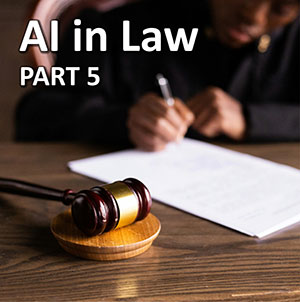 AI isn’t a passing tech trend — it’s a quiet, steady evolution that’s already reshaping how law firms work, bill, and serve clients. The question isn’t if AI will touch your practice, but how and when. Here’s what’s on the horizon for the legal profession — and how to stay secure, compliant, and confident while the world of “smart law” unfolds.
AI isn’t a passing tech trend — it’s a quiet, steady evolution that’s already reshaping how law firms work, bill, and serve clients. The question isn’t if AI will touch your practice, but how and when. Here’s what’s on the horizon for the legal profession — and how to stay secure, compliant, and confident while the world of “smart law” unfolds.
From Curiosity to Capability
Just a few years ago, AI was a novelty — something people played with out of curiosity.
Today, it’s a practical helper.
Tomorrow, it will be a core part of how firms operate, much like email or e-filing.
And just like those earlier shifts, the goal isn’t to make lawyers obsolete.
It’s to make law practice more human — by handing off the repetitive, data-heavy work to machines that don’t get tired, distracted, or overwhelmed.
Let’s take a look at where this is headed.
1️ Seamless Integration: AI That Works Quietly in the Background
The next wave of legal technology won’t require you to “go use AI.”
It’ll simply be there, built into the tools you already rely on.
Examples coming soon:
- Your document management system will automatically detect confidential data and flag it for secure handling.
- Your billing software will notice missed time entries and draft them for review.
- Your practice management tool will draft summaries after client meetings and log them to the right matter automatically.
AI will blend into daily workflows, quietly handling the details while you stay focused on the strategy.
The best AI will be invisible — you’ll just notice your day feels smoother.
2️ Smarter, Safer Communication
Email security and client communication are about to get a major upgrade.
Future AI tools will:
- Detect tone and context, warning you if a message sounds risky or unclear.
- Suggest professional, compliant replies in seconds.
- Auto-encrypt messages when sensitive terms appear (like “SSN” or “trust account”).
In short, AI will help protect you before you hit send — not after.
3️ Personalized Legal Research and Knowledge Recall
Next-generation AI will learn your firm’s history — safely and privately — so you can ask questions like:
“Show me our last three client memos on estate tax changes in Iowa.”
It won’t just search the web. It’ll search your firm’s own brain — pulling past work product, filings, and notes that match your current matter.
That’s where the real productivity lift happens: when AI becomes your trusted memory, surfacing the right information at the right time.
4 Predictive Security and Compliance
Cybersecurity will continue to be the make-or-break issue for law firms.
The future? Predictive defense.
AI will soon detect patterns of risk — before an attack happens — and automatically:
- Isolate affected systems,
- Alert your IT team,
- Launch backup protocols, and
- Document the entire response for insurance and compliance purposes.
It’s the shift from reacting to threats to preventing them altogether.
5️ Ethical and Accountable AI
As AI grows more capable, the ethics conversation will keep pace.
We’ll see:
- State bar opinions clarifying what “reasonable AI oversight” means.
- Court rules requiring disclosure when AI assists with filings.
- Firm policies defining who may use which tools, and how results are verified.
The good news is that lawyers are already built for this kind of accountability.
The same judgment, discretion, and care that define good lawyering will guide responsible AI adoption.
6️ The Rise of “Legal Copilots”
You’ll start hearing a new phrase soon: AI Copilot.
Think of it as a supercharged legal assistant that lives inside your email, document system, or research database.
Your copilot will:
- Listen as you dictate notes,
- Draft client summaries in your voice,
- Cross-check your draft against precedent,
- And prompt you when something seems inconsistent or incomplete.
It won’t replace your expertise — it will amplify it.
Every lawyer will have access to a “team” of intelligent assistants, always on call.
How to Prepare Your Firm Now
You don’t have to chase every new AI tool — but you should start setting the guardrails that will let you use them safely later.
Here’s how to future-proof your practice today:
✅ Create an AI Policy: Define what tools are allowed, how data is handled, and who reviews AI output.
✅ Review Vendor Contracts: Make sure your tech partners protect your client data.
✅ Train Your Team: A 30-minute lunch-and-learn can prevent costly mistakes.
✅ Lean on Legal IT Specialists: Partner with experts who understand both technology and compliance.
Future readiness isn’t about rushing — it’s about getting intentional before the flood of new options arrives.
The Bottom Line
AI isn’t replacing lawyers — it’s upgrading them.
The firms that thrive in this new era will be the ones that embrace innovation with integrity: blending human judgment with machine efficiency.
You don’t have to be a tech expert.
You just have to stay curious, cautious, and committed to doing right by your clients.
And that’s something you already know how to do.
Call to Action: Let’s Build Your Future-Ready Firm
If you’d like to explore how your firm can prepare for next-generation AI—without risk or overwhelm—we can help.
From secure integrations to AI policies and training, we’ll make sure your technology grows with you, not ahead of you.
Let’s plan your firm’s AI future—safe, compliant, and built for peace of mind.
Previous: The Ethics of AI in Law — What You Can (and Can’t) Do Under the Rules


